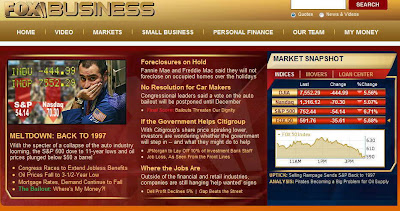
RTGAM
It was an absolute drubbing in Toronto Thursday, with the mining and financial sectors pushing the S&P/TSX to its second-worst percentage loss in its history.
The S&P/TSX closed down 9.02 per cent, or 765.80 points, to 7,724.76 as the price of oil slid as low as $49.50 (U.S.) a barrel. It's the first time the index has closed below 8,000 since December, 2003.
The market's worst day on record was Black Monday in October of 1987, when the benchmark index fell more than 11 per cent.
The energy subindex was pulled down 14.08 per cent, with heavyweights such as Canadian Natural Resources down 21 per cent, Suncor down 13.9 per cent and Encana off 12.3 per cent.
The financial sector also suffered a double-digit loss, down 12.82 per cent after Toronto-Dominion Bank pre-announced its fourth quarter, and said it would take a $350-million hit on credit trading. Its shares were 12.74 per cent lower. Manulife fell 16.5 per cent, while the Royal Bank was down 11.2 per cent.
The Dow Jones industrial average ended the day down 5.56 per cent, or 444.99 points, to 7,552.29 as the worst unemployment numbers in 12 years and uncertainty about the future of the auto sector acted as drags. The broader S&P 500 was down 6.71 per cent, or 54.14 points, to 752.44.
Citigroup led the losers on the Dow, down almost 25 per cent despite the promise of increased investment by one of the bank's largest shareholders, Saudi prince Prince Alwaleed bin Talal. JP Morgan & Chase & Co was down 15 per cent, while Alcoa traded 13 per cent lower.
Copyright 2001 The Globe and Mail
It was an absolute drubbing in Toronto Thursday, with the mining and financial sectors pushing the S&P/TSX to its second-worst percentage loss in its history.
The S&P/TSX closed down 9.02 per cent, or 765.80 points, to 7,724.76 as the price of oil slid as low as $49.50 (U.S.) a barrel. It's the first time the index has closed below 8,000 since December, 2003.
The market's worst day on record was Black Monday in October of 1987, when the benchmark index fell more than 11 per cent.
The energy subindex was pulled down 14.08 per cent, with heavyweights such as Canadian Natural Resources down 21 per cent, Suncor down 13.9 per cent and Encana off 12.3 per cent.
The financial sector also suffered a double-digit loss, down 12.82 per cent after Toronto-Dominion Bank pre-announced its fourth quarter, and said it would take a $350-million hit on credit trading. Its shares were 12.74 per cent lower. Manulife fell 16.5 per cent, while the Royal Bank was down 11.2 per cent.
The Dow Jones industrial average ended the day down 5.56 per cent, or 444.99 points, to 7,552.29 as the worst unemployment numbers in 12 years and uncertainty about the future of the auto sector acted as drags. The broader S&P 500 was down 6.71 per cent, or 54.14 points, to 752.44.
Citigroup led the losers on the Dow, down almost 25 per cent despite the promise of increased investment by one of the bank's largest shareholders, Saudi prince Prince Alwaleed bin Talal. JP Morgan & Chase & Co was down 15 per cent, while Alcoa traded 13 per cent lower.
Copyright 2001 The Globe and Mail




